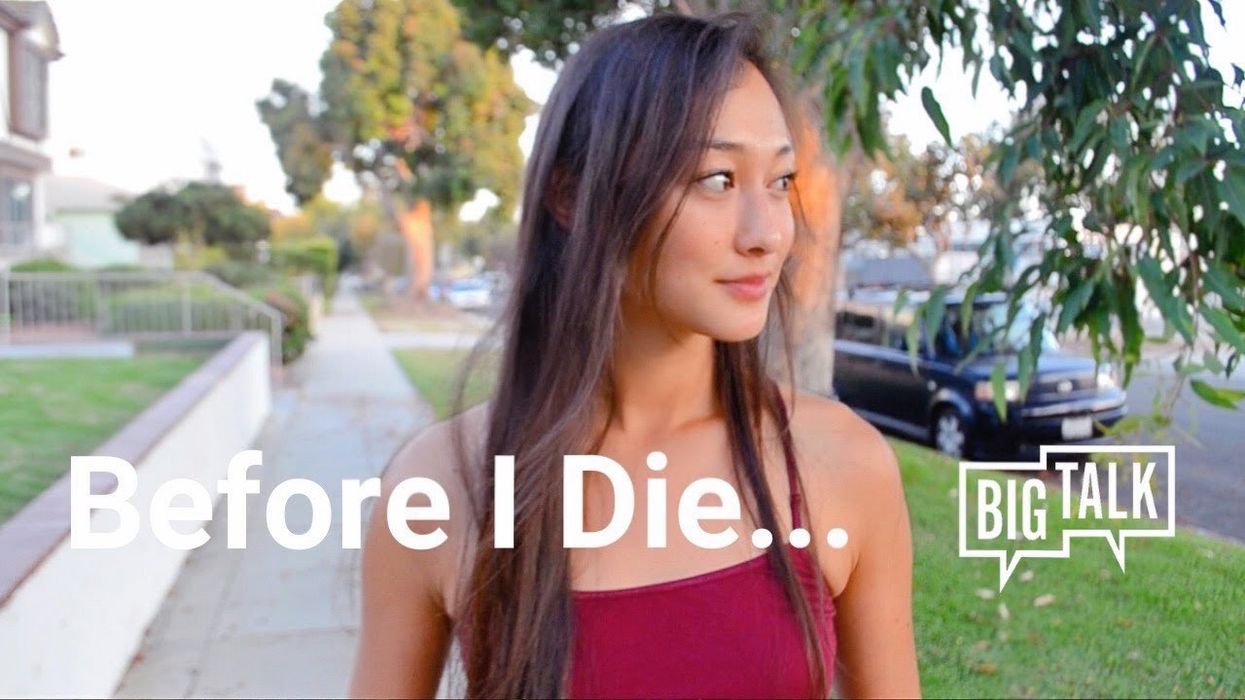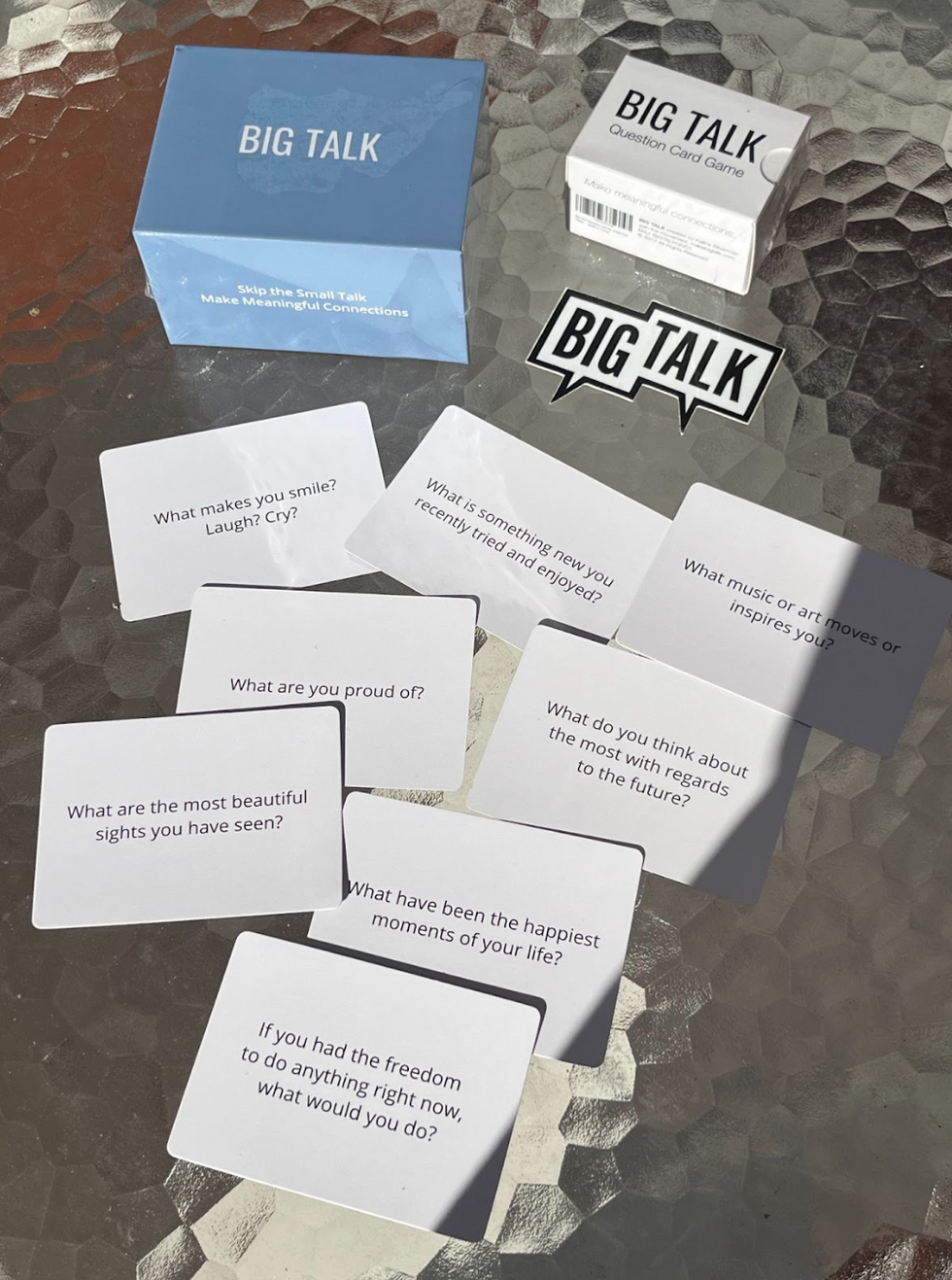Skip Straight to 'Big Talk' and Foster Deeper Human Connection in Video
Kalina Silverman talks about her successful 'Big Talk' TED talks and filmmaking.

Written by Kalina Silverman
When I started Big Talk as a personal video project and social experiment almost 10 years ago, I had no idea it would transform into a global movement for “skipping small talk to make more meaningful connections.”
In 2012 I moved to a new city for the first time—Chicago, IL from Santa Monica, CA. I met new people everyday, but felt a strange existential sense of loneliness at the end of each day.
One night I video chatted with a friend and we had a deep conversation. I thought “Wow, I wish more conversations could be like this.” He said “Yeah—screw small talk.”
Immediately the name ‘Big Talk’ popped into my mind. I didn't know what to do with it at the time, so I tucked it in my back pocket.
The following summer I had the opportunity to work on two documentary film projects. One in Ecuador about Education Reform and one in Germany about the Holocaust. We spent a few weeks in each country walking into places, meeting new people, hearing their stories, and connecting with them right away. We had all sorts of serendipitous encounters as a result. We were invited into government offices, into schools, and into people's homes. It was really inspiring to me that just by showing curiosity for others and wanting to hear their story, you could create all sorts of magical and meaningful connections.
On my last day in Germany, I saw a question written on the Berlin Wall. It said, “What do you want to do before you die?” I thought, that's what ‘Big Talk’ is!
I came back to Los Angeles and I decided to try out a personal, experimental passion project, where I filmed myself walking up to complete strangers and skipping the small talk to ask them, “What do you want to do before you die?”
"Before I die I want to..." | BIG TALKwww.youtube.com
I talked to people from all walks of life—people experiencing homelessness, business people, kids, elderly people. That experiment showed me that what matters most in life are connections and relationships. It turns out that matters to other people too, because I posted it to YouTube and began receiving inquiries from all over the world from people who said they wanted to join the “Big Talk Movement.”
At the same time people started calling ‘Big Talk’ a movement, I was invited to give a TEDx talk (that has now received close to 7 million views on YouTube) and I started receiving a lot of requests to come and do Big Talk workshops, or host Big Talk events.
I hosted dinners where 10 strangers with Big Talk questions on blank note cards would pair up with someone they had never met before to answer the questions. Something so simple was so effective. I was also working in a research lab at the time, so I would test out different questions that people could relate to across cultures. I received a Fulbright grant to move to Singapore to research ways to use Big Talk to build empathy, just by having these very simple, meaningful, human-centered conversations.
One day I got an email from someone who worked at Amazon that said, "My boss's boss saw your TEDx Talk and wants to get this card game on Amazon.” This was back when Amazon was a burgeoning startup, so they really held my hand through the process.
Between speaking engagements, the card game, and making videos, Big Talk has me pretty busy. It's a full-time passion and job at this point. The thing that really keeps me going is all the stories—almost every day I receive messages and emails from people who tell me how Big Talk has shaped their lives.

Making videos—now on my instagram (@makebigtalk)—is my favorite thing to do for Big Talk. I go on sunset walks and that's often where I meet people. Recently, I saw an elderly woman dancing by herself. She came to the beach with her walker, hunched over. Then she put on music, put her walker down, took her cane, and started dancing.
When I saw her I thought, Oh my goodness, I have to talk to this woman. I know she has a special story. I can just tell. Her name is Hazel and she told me about how her son died. She finds joy and remembers him by dancing at sunset.
The video went viral on Instagram reels. People donated to help her get a new walker and fix her car. I took her out to dinner and presented her with the money. Now she and I are friends. We text and she says, “Hi baby girl.” It's really awesome when these seemingly one-time interactions turn into friendships and stories that continue on.
I've had people reach out to me on multiple occasions saying that they got to know their partner through the Big Talk Question Card Game. One guy said he was in a long-distance relationship while stationed in the Army and she was a nurse in the United States. They would write letters answering Big Talk questions back and forth with each other.
Upon returning from deployment I got a message, “I want to propose to her with a Big Talk question card that says ‘Will you marry me?” I was so excited to make that card. A few months later I received engagement photos from his fiancée. I once received an email from a man, who sent me a photo of his baby girl and said, “I just want you to know that because of your card game I got to know my girlfriend at the time, who's now the mother of our baby girl. Cheers to your butterfly effect for that.”
I once received an email from the coach of the LA Lakers G-League team looking for ways to do team bonding. He started bringing out the Big Talk Question Card Game on their bus rides. At first he was nervous because he didn't want them to think it was weird—it's something very different—but he said it ended up going amazingly and that guys started requesting to play it on the bus rides to their game.
The other day I went to an entrepreneur dinner and met this guy who seemed super friendly and talkative and I asked him to do a Big Talk interview. I thought he was just going to be really jolly in his interview, but he ended up breaking down in tears telling me how he's really struggled the past couple of months. That was a real eye-opener for me. It was a reminder of why I do this—you never know what people might be going through on the inside.
A few months ago I shared a story about a man who lost his son and the comments astounded me. So many shared stories about how they had lost their children too. They were connecting with each other and it became this safe forum for people who had experienced grief.'
If there’s one Big Talk question that I would leave you with, it’s one that's really simple, but seems to work very well: What are you curious about lately?
We often don’t give ourselves permission to explore our curiosities, but this question is the first step. And when you ask other people that, it’s such a great way to learn about what’s on people's minds at the moment and what they're actually passionate about. That can lead to really great conversations.
For the month of May, I'm working with the City of Santa Monica's Art of Recovery Program. I'm going to bring an interactive Big Talk installation, I'll set up on the street and people can come have conversations and participate in the art installation.
In June, I plan on hosting a Big Talk festival weekend.
Once I’ve released more information about those two initiatives, I’d love everyone to show up. If anyone reading has a community they want Big Talk to be a part of, don't hesitate to reach out to me!
When she's not igniting social change, Kalina is an avid surfer, tennis enthusiast, community event organizer, painter, and nature lover. Discover more about Kalina's mission to combat the epidemic of loneliness and her work at kalinasilverman.com and makebigtalk.com. Engage with her journey through life's meaningful dialogues by reaching out via kalinasilverman@gmail.com, 310 740 5768, or @kalinasilverman on social platforms.











